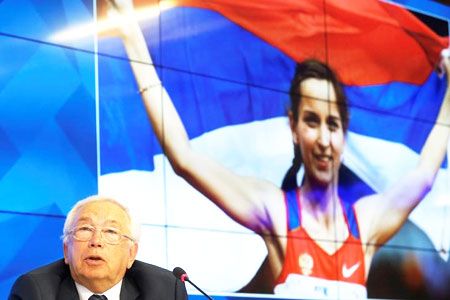Russia blamed politics for a decision to bar its Paralympians from next month's Rio Games because of a state-sponsored doping programme, saying on Monday it would take legal measures to try to overturn the ban.
 The decision to exclude Russia's entire Paralympics team, announced on Sunday by the International Paralympic Committee (IPC), means at least 250 Russian competitors are set to miss the September 7-18 Paralympics.
The decision to exclude Russia's entire Paralympics team, announced on Sunday by the International Paralympic Committee (IPC), means at least 250 Russian competitors are set to miss the September 7-18 Paralympics.
The same scandal has led to 109 out of 387 athletes originally included in the Russian team for the Rio Olympics being banned, including its entire track and field squad.
The imbroglio centres on a report for the World Anti-Doping Agency (WADA) that found the Russian government and the FSB security service had over years covered up hundreds of doping cases across the majority of Olympic sports, as well as Paralympic events.
The findings have rocked Russian sport and tarnished the legacy of the 2014 Winter Olympics in Sochi, which were President Vladimir Putin's showcase.
On Monday, Vladimir Lukin, president of the Russian Paralympic Committee (RPC), said that to bar his country's Paralympians from Rio would be a grave human rights violation.
"The overwhelming majority of sportspeople who were barred from taking part in the Games were absolutely clean sportspeople," he told a Moscow news conference.
"What comes first, the crime or the punishment?"
He told Russian news agencies the decision had a whiff of second-grade politics about it and questioned why the IPC, which he said had previously lavished praise on Russia's Paralympians, had changed its mind so suddenly.
"A week ago, everything was fine," he told the same news conference.
"Then, a week later, something happened and everything is bad. Of course, it gives rise to certain thoughts."
Lukin said the RPC was ready to prove it had met all its anti-doping obligations.
He said only 20 of the 35 Russian Paralympians whose positive drug tests had been covered up between 2012 and 2015, according to WADA, had anything to do with the RPC.
His words were echoed by sports officials in Rio who said a blanket ban was inappropriate and risked punishing clean athletes.
"We are deeply concerned by the IPC's decision," said ANOC President Sheikh Ahmad Al-Fahad Al-Sabah.
"The IPC has decided to suspend Russia ... favouring collective responsibility over individual justice."
But WADA and other anti-doping authorities said the ban was justified in response to a state-backed doping scheme.
"The IPC has rightly put principles before politics in making this most difficult decision," said Doug MacQuarrie, chair of the Institute of National Anti-Doping Organisations.
"The Russian sport system and government have betrayed clean athletes in Russia and around the world."
Sports Minister Vitaly Mutko was cited on Sunday as saying Moscow would appeal to the Court of Arbitration for Sport (CAS) in Switzerland, sport's highest court, and Lukin confirmed that Russia would press ahead with the legal challenge.
Putin himself has also attributed the doping scandal to a political plot, a view widely shared in Russia.
The popular daily Komsomolskaya Pravda, in an editorial, said Russia's enemies were behind the latest ban.
Although not widely followed or celebrated in Russia, where rights campaigners say many disabled people are marginalized by regressive social attitudes and inadequate state support, Russian para-athletes are some of the best in the world.
Russia's Paralympians topped the medal table in Sochi after taking second place behind China at London 2012, and their exclusion from the Rio Games will sting a country that has long drawn pride and prestige from its sporting success.
Image: Vladimir Lukin, president of the Russian Paralympic Committee, speaks during a news conference on Monday after Russia was barred from taking part in next month's Rio Paralympics
Photograph: Maxim Zmeyev/Reuters








 © 2025
© 2025